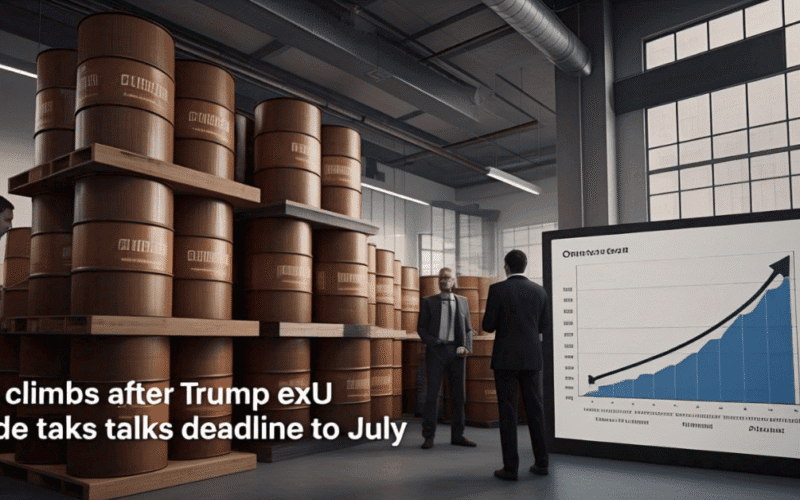Oil prices rise after President Trump postpones EU tariff deadline to July 9, easing market tensions. Discover the impact on global markets and future outlook.(The Times of India)
Table of Contents
- Overview
- Market Reactions
- Factors Influencing Oil Prices
- Implications for the U.S. Economy
- Global Economic Impact
- Future Outlook
- FAQs
Overview
On May 25, 2025, President Donald Trump announced the extension of the deadline for imposing a 50% tariff on European Union (EU) goods from June 1 to July 9. This decision came after a conversation with European Commission President Ursula von der Leyen, who requested additional time for trade negotiations . The postponement has temporarily eased trade tensions, leading to a positive response in global markets.(New York Post)
Market Reactions
Oil Prices
Following the announcement, oil prices experienced an uptick:(Reuters)
- Brent Crude: Increased by 0.6% to $65.15 per barrel.
- West Texas Intermediate (WTI): Rose by 0.6% to $61.87 per barrel .(Economy Middle East)
The delay in tariffs alleviated concerns about potential disruptions in global trade, which could have negatively impacted oil demand.(Reuters)
Stock Markets
U.S. stock futures responded positively:(The Times of India)
- S&P 500 Futures: Gained 1%.
- Dow Jones Futures: Increased by 0.8% .(AP News)
However, Asian markets showed mixed reactions, with Tokyo and Seoul posting gains, while Hong Kong and Shanghai declined.(AP News)
Factors Influencing Oil Prices
Several elements contributed to the rise in oil prices:
- Tariff Delay: Reduced immediate fears of trade disruptions.
- U.S.-Iran Nuclear Talks: Limited progress in negotiations decreased expectations of increased Iranian oil supply.
- U.S. Oil Rig Count: A decline to 465 rigs, the lowest since November 2021, indicated potential tightening in supply .
- OPEC+ Output: Anticipation of a 411,000 barrels per day increase in July could influence future supply dynamics.(Reuters)
Implications for the U.S. Economy
The postponement of tariffs has several implications:(AP News)
- Consumer Confidence: Stabilization in markets may bolster consumer spending.
- Business Investment: Reduced uncertainty could encourage capital expenditures.
- Inflation: Avoiding immediate tariffs helps prevent potential price increases on imported goods.
Global Economic Impact
The extension has global ramifications:
- EU Exports: Provides temporary relief for EU exporters, particularly in the automotive and industrial sectors.
- Global Trade: Signals a willingness for negotiation, potentially averting a trade war.
- Investor Sentiment: Eases concerns, leading to increased investment in risk assets.(The Daily Beas)
Future Outlook
While the delay offers short-term relief, the long-term outlook depends on the outcome of U.S.-EU negotiations. Failure to reach an agreement by July 9 could reignite market volatility. Investors should monitor developments closely, considering the potential for renewed tensions.(Reuters)
FAQs
Q1: Why did oil prices rise after the tariff delay?
A: The postponement reduced fears of trade disruptions, leading to increased investor confidence and higher oil demand expectations.(Reuters)
Q2: How might this affect gasoline prices in the U.S.?
A: Higher oil prices could translate to increased gasoline prices, impacting consumers at the pump.
Q3: What sectors are most affected by the tariff delay?
A: Automotive, industrial machinery, and energy sectors are among the most impacted, given their reliance on international trade.
